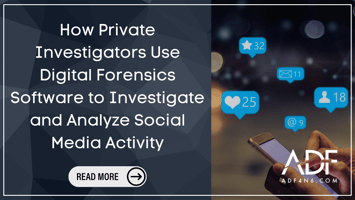The increasing prevalence of cybercrime is a significant global concern that has grown alongside...
Digital Forensics in VR: Investigating Crimes & Analyzing Data
Virtual reality (VR) is a computer-generated simulation or recreation of a three-dimensional environment that can be interacted with and experienced by a user. It typically involves the use of head-mounted goggles that provide a stereoscopic display and sometimes head tracking, allowing the user to look around and explore the virtual world [1].
Users can explore virtual worlds, play video games, and participate in virtual training programs. VR even added the ability for individuals to interact with other users in these shared virtual spaces in the form of chat rooms.
Virtual reality chat rooms, also known as social VR platforms, provide a virtual space where users can interact with each other in real-time using avatars. These chat rooms aim to create a sense of presence and social interaction even though the users may be physically located in different places.
What Kind of Data can be Analyzed by Digital Forensic Software in Virtual Reality?
Social VR platforms add an additional environment where cybercrime can be committed. Users can communicate with each other in real time using voice chat. Some platforms also provide text-based messaging options. Two popular platforms include VR chat and Rec Room. VRChat is directed towards adults, but available to all users, and Rec Room is directed more towards children, boasting a kid-safe COPPA certification for kid-friendly content [2].
It is easy for users to fall prey to cybercrimes in virtual reality platforms, especially ones where children are behind the screen. The types of cybercrimes may include:
- Identity Theft: VR platforms often require users to create accounts and profiles. Cybercriminals may exploit security weaknesses in these platforms to gather personal information, such as usernames, passwords, or even biometric data, for identity theft or fraud [3].
- Virtual Harassment: Just as in online spaces, cyberbullying and harassment can occur within virtual reality chat rooms or social VR platforms. Users may experience unwanted or abusive behavior from others, including stalking, verbal abuse, or the creation of offensive or explicit content [3].
Sex offenders also lie hidden within these platforms and engage in the exchange of child exploitation material. These platforms are not well known for moderators and content filters. Offenders can groom, stalk, or expose themselves to minors [1].
- VR Malware and Exploits: As with any digital technology, virtual reality platforms and applications may be vulnerable to malware, viruses, or malicious software. Cybercriminals could develop VR-specific malware or exploit vulnerabilities in VR systems to gain unauthorized access, control, or compromise user devices [3].
Digital forensic software can collect and analyze data from social VR platforms to help investigate the exploitation of victims. It can retrieve user information such as posts, comments, messages, friend lists, and other relevant data directly from the social platform. The software can facilitate the download process, organize the obtained data, and analyze it as part of the forensic investigation.
Digital forensic software plays a crucial role in collecting data from social platforms, enabling investigators to gather valuable evidence for investigating crimes in virtual reality. It directly retrieves user data, posts, messages, and other pertinent information in a controlled and authorized manner.
ADF’s Digital Evidence Investigator is the #1 automated digital forensic tool for collecting files and artifacts - with the evidence presented in a timeline view. Investigators can collect, analyze, and produce reports on data collected from social platforms. ADF’s forensic tools allow users to view chat conversations with bubbles to quickly identify the senders and receivers with the “Message Thread” hyperlink to select individual conversations. They can filter search results with sorting and search capabilities (dates, hash values, tags, text filters, and more).
Ensure your agency remains technologically current and equipped with the capability to conduct digital forensic investigations within virtual reality. Request a demo below.





